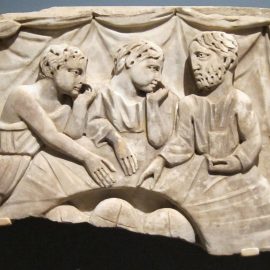

This article is an excerpt from the Shortform summary of "The Federalist Papers" by Alexander Hamilton. Shortform has the world's best summaries of books you should be reading.
Like this article? Sign up for a free trial here .
What is Federalist 84 and what does it say about the Bill of Rights? Why do we need the Bill of Rights?
Federalist 84 is about the need for a Bill of Rights in the Constitution at ratification. Federalist Paper 84 argued that the Constitution didn’t need one immediately, but amendments could be added later.
Read more about the question “why do we need the Bill of Rights” and Federalist 84.
Federalist 84 Addresses Objections
One of the primary objections to the Constitution was that it contained no bill of rights. The Federalist Papers, however, argued that a Bill of Rights was entirely unnecessary. The Constitution already guaranteed the liberties that such a bill would plausibly contain. According to Federalist 84:
- Trial by jury in criminal cases;
- A prohibition on bills of attainder (a law passed by a legislature declaring a specific individual guilty of some crime without due process) and ex post facto laws (a law that makes an act illegal or increases the punishment for it after the accused has committed it);
- A guarantee of habeas corpus (the requirement that a person under arrest be brought before a judge) except in cases where the country was under attack or insurrection
- A prohibition against the conferral of any titles of nobility; and
- A guarantee that impeachment could only result in removal from office
The Constitution already incorporated common law principles from English law, as well as long-established guarantees of political rights that existed in the state constitutions. Moreover, many state constitutions themselves lacked a bill of rights. It made little sense, therefore, to demand one from the US Constitution according to Federalist Paper 84.
(Shortform note: Despite these arguments, even many supporters of the Constitution—including Federalist Papers co-author James Madison—argued that a bill of rights was crucial to secure those liberties that the Constitution did not explicitly protect. The United States Bill of Rights was ultimately ratified in 1791 as the first ten amendments to the Constitution. Among other liberties, they guaranteed freedom of religion, freedom of speech, freedom of the press, due process, freedom from cruel and unusual punishment, and the right to bear arms.)
Inevitably, future generations of Americans would see the need to update the Constitution to meet new challenges. The Framers could not anticipate what these needs and challenges would be, but they created a process by which the Constitution could be amended.

———End of Preview———
Like what you just read? Read the rest of the world's best summary of Alexander Hamilton's "The Federalist Papers" at Shortform .
Here's what you'll find in our full The Federalist Papers summary :
- The genius of the founding fathers in how they designed the United States Constitution
- Why it was critical for the United States to form a union rather than stay separated as colonies
- How Alexander Hamilton anticipated social issues that are still relevant today






